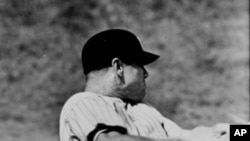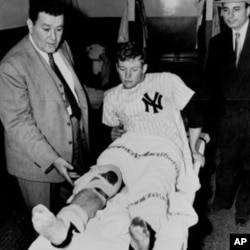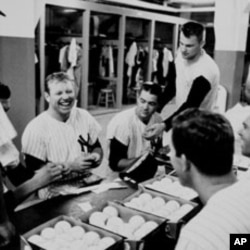Mickey Charles Mantle is one of the few Major League Baseball players who continues to fascinate new generations. Starting in 1951, the then 19-year-old joined the New York Yankees and became known for his speed, power and ability as a switch-hitter able to bat both left and right-handed. Author Jane Leavy has written a new biography of Mantle, which tells of the impact he had, not only on baseball, but on the country as well. Her book is titled The Last Boy - Mickey Mantle And The End Of America's Childhood.
Love for baseball
Mickey Mantle was born in Oklahoma in 1931, the son of a miner. But his father "Mutt'"s love was baseball. He played in a semi-pro league, and almost before young Mickey was out of diapers, his father was practicing with him every day.
Mickey was a star athlete in high school and was noticed by the New York Yankees, who signed him to a minor league contract in 1949. After two years in the minor leagues, Mantle made the Yankees' roster in 1951. Jane Leavy says Mantle's speed on the base paths and home run power reflected the mood of the country.
"It was a time of unparalleled American optimism," she said. "We were flexing our muscles and we thought that we could pretty much do anything," she said. "And the natural resources of the land seemed to reflect themselves in Mantle's unprecedented alloy of speed and power. And when you looked at that smile of his, he seemed to capture the breadth of our optimism."
Dark clouds
But from early on, it seemed like a dark cloud followed Mantle. He was kicked in the leg during a high school game and developed a dangerous bone infection, osteomyelitis.
During his rookie season, Mantle suffered a knee injury when he caught his spikes in an outfield drain while trying to avoid a collision with Yankees' star center-fielder Joe DiMaggio. The next day, his father, Mutt, was diagnosed with non-Hodgkin's lymphoma and died at age 40. Jane Leavy talks about the impact his father's death had on the young Mantle.
"Mickey grew up in a world where early death and hardship were the norm. The fatalism that he always spoke about, the 'I'll never make it to 40, none of the Mantle men ever make it to 40,' was something that pre-dated his father's death at 40 when Mickey was just in his second year at the Yankees," said Leavy.
In spite of those setbacks, in 1952, Mantle established himself as one of the best hitters in baseball. He batted .311 with 23 home runs and 87 runs batted in RBIs. That season he hit a ball completely out of Washington D.C.'s old Griffith Stadium. It landed more than 172 meters away, and is still believed to be the longest home run ever hit. New York won the World Series during each of Mantle's first three seasons 1951 to 1953.
On the way to success
With Mantle leading the team, the Yankees continued their dominance into the late 1950s, capturing the American League pennant each year from 1955 to 1958 and taking the World Series in 1956 and 1958. Mantle won the Triple Crown in 1956 with a .353 batting average, 52 home runs, and 130 RBIs. He was also selected the American League's Most Valuable Player MVP, an honor he won again in 1957 when he hit .365.
But despite his success, Mantle's personality was a study in contrasts. Though loved and admired by fans across the country, he could be friendly and happy one minute, then angry and cold the next. It seemed the only place he was ever really comfortable was in the clubhouse with his teammates. They drank to excess together, caroused together and got into scrapes with the law together.
But in that different era, police, as well as journalists, protected "The Mick" and his cohorts, never arresting them or writing about their drunken escapades. Mantle was on the path to becoming an alcoholic, but, Jane Leavy says, Mantle rarely suffered the consequences of his actions.
"Jerry Coleman, his teammate and one-time roommate said, 'You know, he never grew up and it ruined him.' I think he would have been way better off had he lived in a time and place where he was held more accountable, where he was forced to grow up. Had he been called on [held accountable for] his more reckless behavior, he might have been forced to confront his own excesses earlier. And that would have been better for him," added Leavy.
Family life
Leavy says Mickey Mantle loved his wife and family, but was distant from his children, and had dozens of extra-marital affairs, some lasting for years. Through it all, Mantle continued his spectacular performance on the field, despite being in almost constant pain from osteomyelitis and other injuries. In 1962, he was named the American League's MVP for the third time. And while the Yankees continued to win the pennant (American League title), they lost the World Series to the Los Angeles Dodgers in 1963 and to the St. Louis Cardinals in 1964.
In 1965 the Yankees started to slide into mediocrity. Mantle was in increasing pain, striking out more and more, and said the game was no longer fun. But he played through the 1968 season. Jane Leavy says Mickey Mantle retired with numerous records and achievements.
"He hit 536 home runs when 536 home runs really meant something, prior to the 'Juiced [steroid] Era.' When he retired at the end of 1968, that put him third on the major league list," she said. He was undoubtedly the greatest switch-hitter that ever lived. He was the epitome of post-war American power."
Mickey Mantle played 2,401 games for the Yankees. In addition to his home runs, three MVP awards and Triple Crown Award, he led the American League in home runs four times. He played on 12 pennant-winning and seven World Series-winning teams. He still holds the all-time record with 18 home runs in World Series play, as well as numerous other World Series records. Mickey Mantle was elected to baseball's Hall of Fame in 1974.
After retiring from baseball, Mantle pursued a number of businesses, most of them unsuccessful. To make money, he made appearances to sign autographs and play in golf tournaments. He also did public relations work for a casino in Atlantic City, New Jersey - a move that got him temporarily banned from baseball.
Losing the battle
Mantle lived in denial of his alcoholism until 1994, when he went into rehabilitation at the Betty Ford Clinic and stopped drinking. But after his release, Mantle learned that his years of heavy drinking had left him with cirrhosis of the liver, hepatitis-C and liver cancer.
Although he received a liver transplant in June 1995, the cancer had spread to other organs, and Mantle died two months later. Despite the controversies surrounding his personal life, his outstanding abilities on the baseball field and courage in the face of pain made him a hero to a generation of baseball fans.



